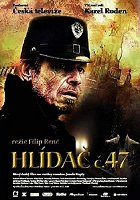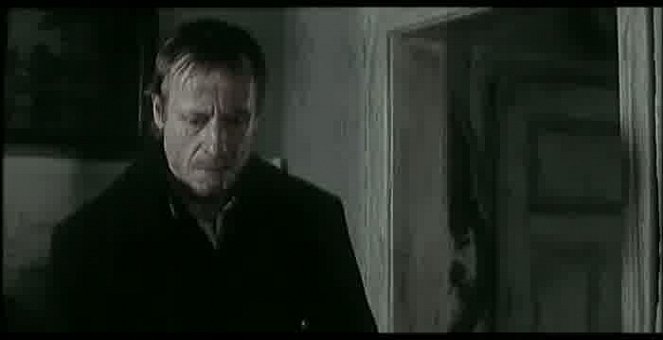Rendező:
Filip RenčOperatőr:
Karel FairaislZeneszerző:
Jiří ŠkorpíkSzereplők:
Karel Roden, Lucia Siposová, Václav Jiráček, Vladimír Dlouhý, Norbert Lichý, Zdeněk Dušek, Vladimír Kulhavý, Luboš Veselý, Zuzana Šavrdová (több)Tartalmak(1)
A történet hőse Josef Douša vasúti őr, aki az első világháborúból tér vissza, abban a reményben, hogy el fogja felejteni a közelmúlt élményeinek minden borzalmát magányos őrházában, gyönyörű fiatal felesége oldalán. Egy nap megmenti egy fiatalember életét, aki a vonat alá akar feküdni. A férfi azonban beleszeret Douša feleségébe, aki felkelti a férfi szenvedélyét. Douša, a férj megsüketül, és amikor hallása visszatér, senkinek nem árulja el - még a feleségének sem. Csak így tudhatja meg, hogy felesége hűtlen volt-e hozzá... (MTVA)
(több)Videók (1)
Recenziók (4)
I actually don't know what I expected from the movie "Guard at Number 47." Maybe a bit of a war movie, perhaps a little action. I'm not saying that there isn't anything like that, but it's just about snippets, memories of the main character, Josef Douša, in the trenches. The interweaving of reality with memories is really strong, intense, and along with Karel Roden's acting in the lead role, they are the greatest positives of the film, which is nothing more than a story about a love triangle and the consequences that such a situation can have and does have. Sometimes it just doesn't pay off when you save someone's life. Within ten to fifteen minutes, the basic plot is established, which is also almost immediately resolved. The film doesn't bring any surprises and in terms of the screenplay, it's a classic story that doesn't stand out in any way. It was mainly a great opportunity for Roden, who truly played a concert and in moments when he has to play a deaf character, he is absolutely perfect. Apart from his appearance, his voice, which is also unforgettable, helps him in that as well. Lucia Siposová or Václav Jiráček next to him then look like two students who have just enrolled at FAMU and already think they can play in the premier league. Their acting is not very suggestive and not very believable. They are not characters, they just play them. Roden is a character, Roden is Douša. When I think about those actors, I certainly can't forget about Vladimír Dlouhý, who is incredibly sleazy and the second-best actor in the film after Roden. Filip Renč managed to shoot a film that doesn't have as much potential as it may seem. Actually, it is a chamber film of one person who is not living a good life, but on the contrary, is suffering and it doesn't seem like it will ever end. More: http://www.filmovy-denik.cz/2012/12/umirajici-zvire-4-vanoce-slunce-seno-2.html
()
Probably the best movie by Filip Renč and the first of its kind, where after watching it, I didn't feel the need to be enthusiastic about my dance steps or satisfy my shopping cravings. I don't particularly like this director because of his music video-like and mostly commercial aesthetics, so I can't give it more than four stars, even if I wanted to. I don't take away from the film its decent craftsmanship, good camera work, or soundtrack, but it seems to me that the director is always playing for effect, so the characters overact a little, displaying overly exaggerated emotions. The music and visuals aggressively attack the viewer's senses - and maybe I am just biased because I don't agree with Renč's political and lobbying contacts and business deals. Overall impression: 60%.
()
Karel Roden - good. Vladimir Dlouhý - good. Václav Jiráček - terrible. Lucia Siposová - only good to look at. Cinematography - beautiful. Music - decent. Direction - traditional Renč, or weak and not very interesting. I can imagine this film at 8:00 pm on Sunday on TV, shortened to an hour and a half, or two parts. It wasn’t a good fit for the movie theater. Two and a bit.
()
Renč's version of the film is fortunately quite different from the previous adaptations by Rovenský and Haas. We can find differences on all levels, from the setting in the winter landscape, the accentuation of the fighting in the trenches to the completely differently portrayed relationship between the Douša family - even their elder son is missing and the spaces of the inn and the cemetery are very important. The merchant became a gravedigger and the aged minister got a lot of space. Yet the main motif remains, as well as the oppressive atmosphere, but the motivations of the main characters' actions are more akin to today. The morality of the true rural people of the 1920s is now incomprehensible to the wider world. In addition to the beautiful images, the film also offers excellent performances by Roden and Vladimír Dlouhý, but unfortunately, their teammates Siposová and Jiráček are very weak. Siposová at least managed to be stylized, but Jiráček never became a real actor, although he had many opportunities to do se.
()
Galéria (46)
Photo © Česká televize



Hirdetés